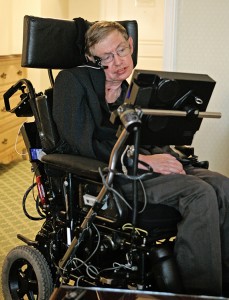Stephen Hawking (1942-2018)
March 15, 2018
Yesterday, March 14, famed British theoretical physicist Stephen Hawking died in Cambridge, England, at age 76. Hawking made some of the most important discoveries about gravity since Albert Einstein. Einstein, a German-born physicist, invented general relativity, the modern theory of gravity, in 1915. Hawking worked to increase our understanding of the earliest history of the universe. His work supported the theory that the universe began in a cosmic explosion called the big bang.

British theoretical physicist Stephen Hawking answers questions on a computer attached to his wheelchair during an interview in 2007. Hawking died on March 14, 2018. Credit: © John Raoux, AP Photo
Hawking is probably best known for his theories about objects called black holes. A black hole’s gravitational force is so strong that nothing—not even light—can escape it. Hawking used a field of physics called quantum mechanics to show that a black hole nevertheless gives off particles and radiation until it eventually disappears. These emissions became known as Hawking radiation. He also proposed that tiny, atom-sized primordial black holes were produced in the early moments after the big bang. In addition, Hawking worked to combine quantum mechanics and gravity into a single unified theory.
Three of Hawking’s books became international best sellers. They were A Brief History of Time: From the Big Bang to Black Holes (1988), The Universe in a Nutshell (2001), and The Grand Design (2010), which he co-wrote with American physicist Leonard Mlodinow. Following the success of A Brief History of Time, Hawking became a recognizable figure in popular culture, appearing in or lending his distinctive image and voice to various television shows. In 1991, American director Errol Morris made A Brief History of Time into an award-winning documentary film.
Hawking suffered from amyotrophic lateral sclerosis (ALS), an incurable disease of the nervous system. He could not speak or move more than a few hand and face muscles. Using a wheelchair and a computer voice simulator, however, he wrote and gave professional and public lectures around the world.
Hawking received numerous prestigious awards, including the Royal Society’s Copley Medal, the Gold Medal of the Royal Astronomical Society, and the American Presidential Medal of Freedom. He spoke on issues concerning science and society, such as genetic engineering, the colonization of space, and artificial intelligence.
Stephen William Hawking was born on Jan. 8, 1942, in Oxford, England. In 1966, he received a doctorate degree from Cambridge University. He afterward held a variety of research posts there. From 1979 to 2009, he held the prestigious position of Lucasian professor of mathematics at Cambridge, a chair once held by the English scientist and mathematician Sir Isaac Newton.


